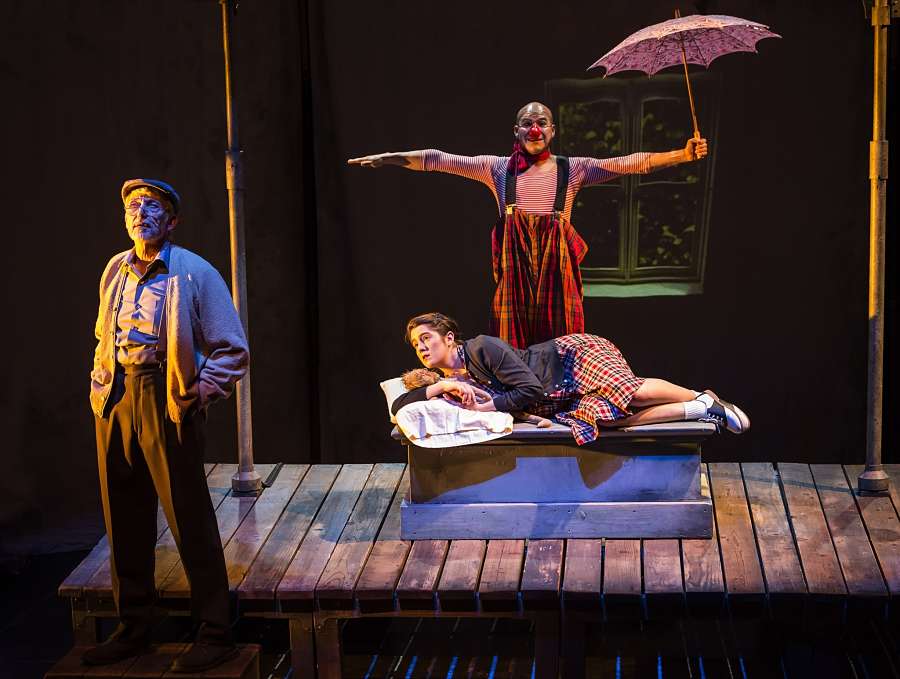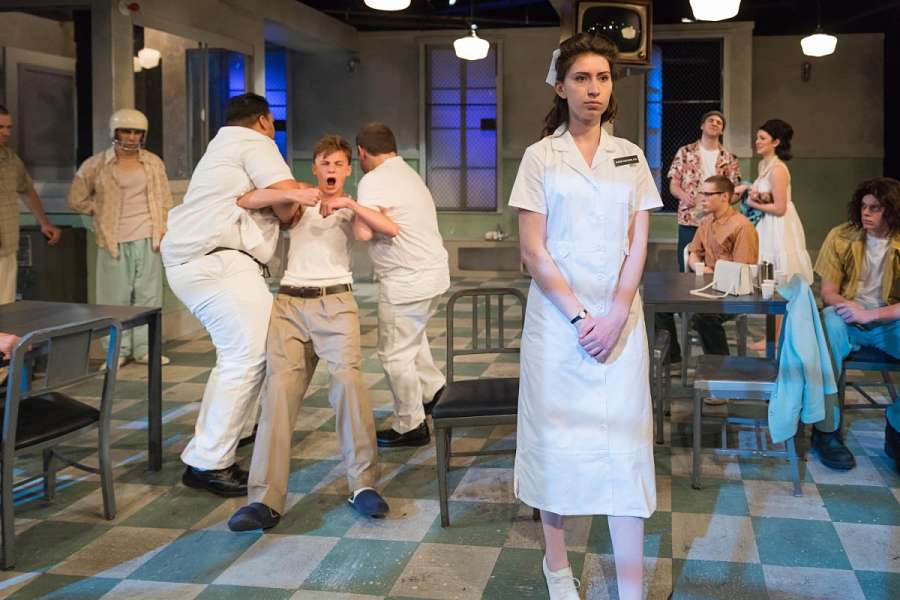The Public Theatre’s production of Julius Caesar was by no means the only controversial play this year. In April Boston Children’s Theatre produced One Flew Over the Cuckoo’s Nest with a cast of teens and young adults as a part of its young actors’ training program. According to the Boston Globe, the production made waves when a 21-year-old actor briefly appeared nude onstage. Several board members resigned, and executive artistic director Burgess Clark, who directed the play, agreed to a layoff while the remaining staff and board worked to find consensus.
Various details suggest that the falling-out was as much about miscommunication as it was about the nudity itself. But the incident is a reminder of how theatres for young audiences (TYA) often have to tread carefully when it comes to what’s considered appropriate (and what’s not). As Larry Coen, artistic director of Boston’s City Stage Co., observed, “If the company did not have the word ‘children’ in its name, the entire event might have gone unnoticed.”
What does it mean for a show to be “appropriate” for young audiences, and how do TYA artists reconcile the pressure to stay within the bounds of propriety and taste with their artistic impulses, not to mention their desire to speak honestly to kids about the world?
Most often TYA encounters this kind of question with content that’s simply sad, not shocking. Australia-based playwright Finegan Kruckemeyer, who advocates for this kind of work, addresses this issue in his essay “The Taboo of Sadness,” in which he explains how plays with young protagonists who face tragedy can offer children models of resiliency. Kruckemeyer often writes about kids dealing with loss in fantastical settings, such as a girl who wakes up to find that she’s the only person left on the planet. He’s had 85 plays produced in 18 countries, a testament to what “appropriate” means internationally.
“My governing philosophy is that no material is off limits, but that a considered and tactful hand must steer this material into being,” Kruckemeyer says. “To shock a young (or indeed any) audience without regard is poor form. And to deny complex truths for viewers who may live them (not in a perfect world, but simply in a world) is as well.”

At 24th Street Theatre in Los Angeles, they’ve felt the pushback against putting sadness onstage. The company recently completed a tour of Walking the Tightrope, a play by British writer Mike Kenny that executive director Jay McAdams calls a “sweet tone poem” about a girl helping her grandfather deal with his wife’s death. The production won several L.A. theatre awards, and was showcased at the 2014 International Performing Arts for Youth booking conference. Many presenters there told McAdams they loved the show but felt it was too risky to bring to their theatres.
“All week people said, ‘That was one of the best pieces of theatre I’ve ever seen in my entire life, but it made me cry, and if people cry in my theatre, I’ll be fired,’” says McAdams. “We’ve always thought that children’s theatre should be provocative, but there’s a downside. Presenters want to book us on a nine- or 10-city tour. If you’re doing Pinkalicious, you’ll get a 60-city tour.”
Downbeat material isn’t the only third rail in TYA. In 2014 a group of Northwestern University students toured The Transition of Doodle Pequeno by Gabriel Jason Dean to elementary schools. Geared toward fourth and fifth graders, the play features a boy who wears a tutu and a group of boys who use the word “gay” as a slur. A teacher at one of the schools complained about the content to the principal, and another school cancelled the presentation.
Rives Collins, a prolific TYA director and theatre professor at Northwestern, emphasizes the importance of transparency and disclosure when bringing edgy work to schools, and notes how better communication could have prevented the school cancellation.
“My initial thought was to jump on board on the side of these student producers,” Collins says. “I’d seen the show done on campus and it was beautiful. But the school drama specialist and the principal didn’t know what the play was, and so couldn’t prepare their community. I think the students sent out the right materials, but there was a sense of a school being taken by surprise.”

In some cases, the content that parents and teachers find provocative is not what artists anticipate. This past season, 24th Street Theatre produced Hansel and Gretel Bluegrass by Bryan Davidson. McAdams and the creative team struggled over how to portray Gretel’s killing of the witch, but that scene isn’t what troubled one audience member. Namely, the show’s booking agent, was concerned that a narrator character—a grizzled radio host in 1930s Appalachia, played on video segments by Bradley Whitford—sips from a flask, believing this small detail would keep the show from getting any bookings.
“It had integrity in terms of the character, but we had to cut it,” says McAdams. “Killing the witch was fine with people because it’s part of the plot, but for us it’s the opposite. You can go into any restaurant in America and order a glass of wine. Drinking is not a moral issue for us, but killing and violence are. That’s what I want to protect our kids from, and that’s the epidemic we face in our country—not talking about when your grandparent dies or showing an old man with a flask.”
Collins and Kruckemeyer have been similarly surprised about what shocks parents and teachers. Collins has directed readings of Ever in the Glades, a play by Laura Schellhardt aimed at ages 12 and up, which the Kennedy Center of the Performing Arts will present next year.
“The most pushback we’ve received so far is to the phrase ‘goddamn,’” Collins says. “There are other swear words in the play, and nobody so far has said anything about the alcoholism, or the potential abuse of a young girl by adult men. All of those things sort of pass under the radar, but the concern so far is with the religious overtones of that one phrase.”
Says Kruckemeyer, “I’ve discovered my (unwitting) propensity for blasphemy since working in the U.S., and have always been happy to remove individual words where they don’t affect the tone of a line. A peppering of societal taboos and sociopolitical themes has raised eyebrows—some expectedly, like refugee advocacy and indigenous rights, others surprisingly, like referencing evolution.”
There is a consensus that TYA companies are doing much more provocative work outside the U.S. Collins points to the ASSITEJ conference, an international gathering of TYA artists, which took place in Capetown, South Africa this past May.
“There was a piece done by a Belgian company called Us/Them,” Collins says. “It was essentially about a Chechen school that was taken over by terrorists who held a school community hostage. This was advertised for students ages 14 and up. There was a group of girls in the audience who said, ‘I would see that play 10 times in a row, I loved it so much,’ and there was zero pushback about how this was inappropriate for young people.”
Says McAdams, “There’s work at ASSITEJ that you won’t even really recognize as children’s theatre because it’s just good theatre. But you might see someone light a cigarette in a play. Can you imagine the sound of seats slamming in a children’s theatre if you had a cigarette onstage in this country? I’m not saying you should have a cigarette in a children’s show, but I can think of some reasons why a character in a children’s show might smoke. I think we need to be realistic about the world we live in and a have a real dialogue about what we think is appropriate for our children.”
There does seem to be a desire among American TYA artists to engage in that dialogue. At the Write Now conference in Tempe, Ariz., this past March, Collins conducted a survey of approximately 40 TYA writers, directors, artistic directors, and other TYA professionals. Seventy-seven percent of responders agreed or strongly agreed with the phrase, “As artists, we have a responsibility to ensure that our season programming is in direct response to what is happening in the world.” Seventy percent disagreed or strongly disagreed that “Childhood is fleeting and precious. We should allow children to be children to be children for as long as possible; they will have plenty of time to grapple with the problems of the world when they grow up.”
“The results to that question would have been very different in a different era,” says Collins. “It would be interesting to check it against other kinds of data you could pull together. If respondents were surveying their audiences, how would they answer these questions?”
Still, there’s clearly a long way to go in the U.S. before such ideals become the norm. “I spoke to the managing director of a major children’s theatre, who said, ‘I’ve got board members who are bank presidents. I could lose a million dollars if I say the wrong thing about politics or the world,’” says McAdams.
Collins emphasizes the importance of building partnerships with schools and communities to help more challenging work succeed. “There might be some groups where we say, ‘We might not be partners on this particular production,’ or ‘our styles don’t necessarily mesh,’ so one form of partnership is to agree to disagree and walk away. But in a world where finding audiences is sometimes challenging, building bridges between audiences and producing organizations is so important. I think that kind of dialogue is really necessary.”
Hopefully Boston Children’s Theatre, and other TYA companies across the U.S., will take this attitude to heart.


